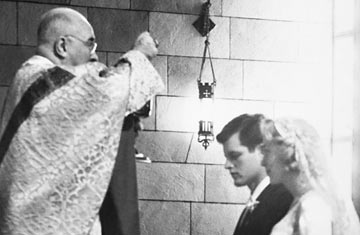
Francis Cardinal Spellman of New York celebrates the Nuptial High Mass as Ted Kennedy weds Joan Bennett at St. Joseph's Church
(2 of 2)
Kennedy also relied on his faith as he watched his two eldest children struggle with cancer. While his daughter Kara was undergoing treatment at a nearby hospital in the Mission Hill section of Boston, Kennedy used to stop for prayer at Our Lady of Perpetual Help Basilica, the church where his funeral will take place on Saturday, Aug. 29. The amount of time her youngest child spent in churches would have surprised and gratified Rose Kennedy. In 1995, Teddy spoke of her legacy, "She sustained us in the saddest times by her faith in God, which was the greatest gift she gave us."
As his faith became a bigger part of his life, Kennedy became more sensitive to accusations that Democrats were godless and hostile to religion. One week after the 2004 election, he placed a call to the left-leaning Evangelical leader Jim Wallis. "They're saying we're not religious," Kennedy told Wallis. "But we know that's not true." Wallis spent an evening at the Kennedy home, talking with the Senator and Vicki, and left surprised by what he heard. "I'd never heard Ted Kennedy speak publicly about his faith the way some other politicians do," Wallis recalls now. "But the conversation was very personal and very theological — we talked about Scripture and Catholic social teaching and moral issues, including abortion." Kennedy, he says, "was deeply conflicted on abortion, feeling kind of trapped by the liberal side, frankly."
Indeed, abortion was the main topic for which Kennedy received criticism from church leaders. He had begun his political career opposed to abortion — in a 1971 letter, Kennedy wrote, "Wanted or unwanted, I believe that human life, even at its earliest stages, has certain rights which must be recognized." But like many other Democratic politicians, he became a supporter of abortion rights by the 1980s. By the end of his career he was regularly awarded a 100% positive rating from NARAL Pro-Choice America for his abortion-related votes, a record that put him at odds with Church leadership.
The history of American Catholicism will no doubt highlight the fact that John Kennedy had to prove that he wasn't too Catholic in order to win the presidency in 1960, and 40 years later, his brother watched as Democrats like Kerry faced down charges that they weren't Catholic enough. "Abortion is the big issue, and John Kennedy never had to directly confront that," says Shaun Casey, author of The Making of a Catholic President. "We'll never really know how he might have handled that."
Even so, John Kennedy's election and Ted Kennedy's decades-long leadership helped form a strong Catholic identification with the Democratic Party that still resonates. Catholic voters have shifted to support Republican candidates in some elections, but they maintain a connection with the Democratic Party that doesn't exist in the same way with, for example, Evangelical voters. Those photos on the wall, and the Catholic social teaching behind the social-justice issues that Ted Kennedy championed, continue to exert a pull.
And ultimately, says Casey, Senator Kennedy's relationship with Catholicism is one familiar to many American Catholics. "He went through a period of alienation from the Church," says Casey. "But he came back on his own terms. He made a form of peace with the Church. That should give hope to lots of Catholic Democrats that they might find a way to stay in the fold."
